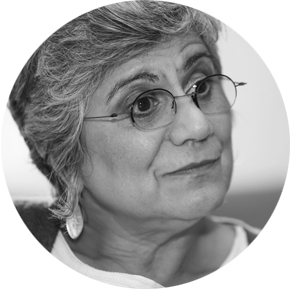In April of 2018 Professor Ani Aprahamian of the Physics Department of the University of Notre Dame (Indiana, USA) was appointed Director of A.I. Alikhanyan National Science Laboratory (Yerevan Physics Institute, YerPhI). In three months of leadership Professor Aprahamian has tried to give YerPhI new life, attaching special importance to young scientists and their potential.
In an exclusive interview to Mediamax Ani Aprahamian told about her path in science, personal achievments, strategic approaches in managing YerPhI and her ways of finding solutions in science.

She is a member of scientific organizations and unions in different countries: AAAS, ACS, APS, Sigma Xi, New York Academy of Science.
Ani Aprahamian is the co-chair of a committee with the National Academy of Science on a U.S. Electron Ion Collider Facility, U.S. Liaison for the International Union of Pure and Applied Physics (IUPAP) Commission on Nuclear Science, as well as member of IUPAP Working Group on Astro-Particle Physics, the Board of Directors for South Dakota Science and Technology Authority (Sanford Underground Laboratory), and many other science commissions on nuclear physics.
Ani Aprahamian is also experienced in management of various American and European scientific programs, especially on nuclear physics and production of isotopes. She has authored over 200 scientific publications.
Ani Aprahamian is a foreign member of Armenian National Academy of Sciences.
***
I know that your desire and big dream of pursuing sciences was born when you saw the first picture of the man on the Moon. Why did you choose physics as your main direction?
I loved science from early childhood, thinking about what the reality was and whether there were ways of understanding it. When the Americans reached the Moon for the first time, I was indeed motivated by seeing the real picture. My grandmother wasn’t happy about that, as she thought that the scientists were getting involved in God’s affairs and the end of the world was coming soon.
 Ani Aprahamian
Ani AprahamianPhoto: Mediamax
We didn’t have equipment to perform experiments in Lebanese schools, but we had books, presented by American-Armenian philanthropists. I saw glass laboratories and tables in those books, and when I got my first room in Lebanon, I used to imagine that it was my laboratory simply without glass tables for performing experiments from those books.
First I decided to study chemistry at the university. I used to put on beautiful dresses, which got ruined during the experiments. I took physics when I was in the third year of studies, as I understood that this discipline attracted me more than chemistry. My professor said that not chemistry but physics was my passion. So I changed my direction and started to study nuclear physics. I was hopeful that one day this discipline was going to be useful for Armenia, when it was still impossible to dream about independent Armenia and the development of nuclear physics in the country.
I never anticipated becoming a professor. I thought I was just supposed to work somewhere, though it turned out that science determined all my life.
We used to have developed science during the Soviet times, while now a number of issues prevail in the sector. What is your assessment of the development of sciences in Armenia and what should we undertake to reach the international level?
Soviet people were encouraged to pursue sciences: they received good salaries and science was respected.
Armenia has numerous great scientists with powerful potential. If you want to be competitive in the world, you need to present some serious scientific results. It is very difficult for our scientists, but they should stop “hiding behind problems” and start working together. I have just been appointed Director of A.I. Alikhanyan National Science Laboratory (Yerevan Physics Institute, YerPhI), and I think that we need to collaborate and come up with new applications to the world.
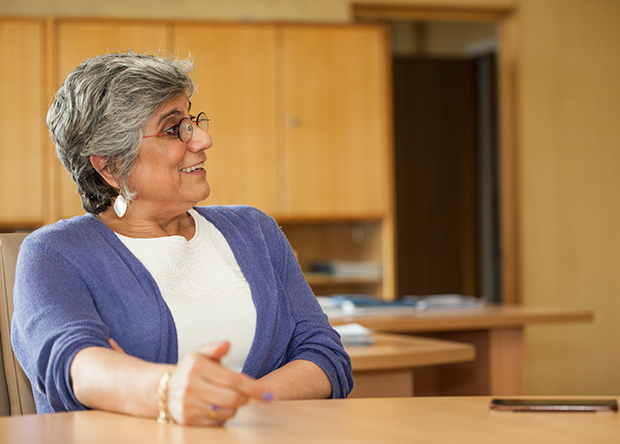 Ani Aprahamian
Ani AprahamianPhoto: Mediamax
Today we have new opportunities to introduce our proposals to Europe or the West. In my view, the majority of Armenian scientists do not have a clear idea of how the process happens in the modern world. I hope we can make a difference.
Your appointment as Director of YerPhI was accepted with great excitement, and many people anticipate revolutionary approaches. What are you current plans and what is your strategy in leading this scientific establishment?
Since 2009 I was involved in International Scientific Board, created to define the directions of perspective development, make reforms in management of the institute and increase the efficiency of scientific observations. Our board gave ideas for the operation of the institute.
The idea of the cyclotron, born back then, aims at starting research in both low energy nuclear physics and serious healthcare program.
Being involved in high energy nuclear physics, the majority of the Armenian scientists don’t like the fact that it is also possible to develop low energy nuclear physics. Nonetheless, there is another important issue: if you wish to move forward young people, you need to provide conditions for young people to create something on their own and learn without confining them to only data analysis.
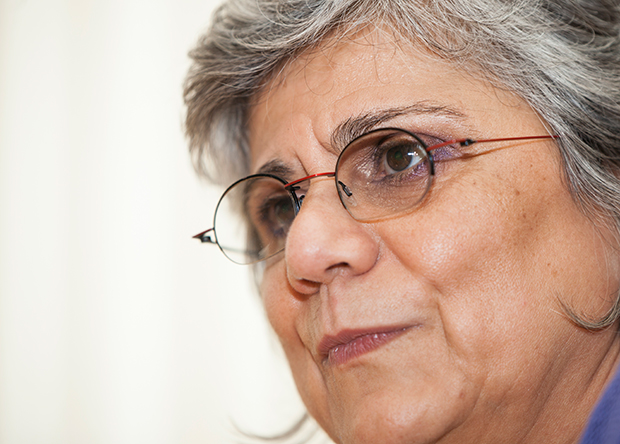 Ani Aprahamian
Ani AprahamianPhoto: Mediamax
I think we should start studying low energy nuclear physics, as there are many programs, which can contribute to the economy of the country. We have nuclear energy, and we are going to have nuclear medicine. There are also a number of other directions that we can benefit from.
We have great theorists in Armenia, and we wish to improve their recognition. We are engaged in astrophysics at our institute. So why wouldn’t Armenia have its own satellite? We study applied physics, but we don’t have relevant equipment...We can and we should solve these issues.
The fund provided to the State Committee of Science of Armenia from the state budget of the Armenian government isn’t enough to implement our projects. We should compete on international platforms now, and Horizon 2020 program by the European Union is a great opportunity to attract funds.
Alikhanyan National Science Laboratory has many scientists, who already work with different countries. We should expand the cooperation and empower ourselves and our name around the world. Armenia must be the leader and not the follower, and this is very important for me.
Recently we have organized a competition, initiated by former Director Ashot Chilingarian, who offered me to participate. I included the demand that the assessment of scientific works must take into account their impact on Armenia. Many of us can do a study, put our names on the work and get it published, but what matters is the impact the work can have on Armenia and Armenian science.
I want to focus on that, although everything will have to be done with financing from abroad, because our funds are insufficient.
There is an evident gap in the state-science-society chain in Armenia and worldwide. The state has to give the scientific sector concrete orders for the latter to do targeted work. How do you see the cooperation between these three segments?
We should explain to the public what we are doing here. The connection between the three segments you mentioned is important. The Armenian people should know what the scientific sector is working on, and we plan to hold a big conference in September.
This year we celebrate the 75th anniversary of Alikhanyan National Science Laboratory. We decided to invite school students to the institute and show them what our scientists do, let them see and touch the equipment. Moreover, we will organize weekly lectures on physics and other scientific fields not only for the institute staff, but for ordinary citizens too. We want other people to have the opportunity to become closer to science. I believe we need to be more open to the public.
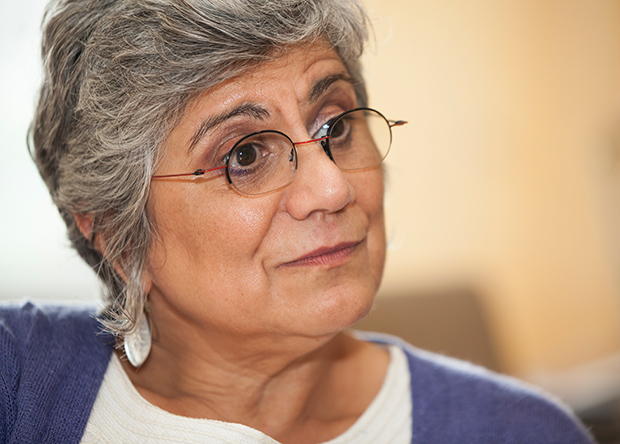 Ani Aprahamian
Ani AprahamianPhoto: Mediamax
The government is ready to assist us in any way. The first point on our agenda now is the cyclotron. I have met with people from departments of different state agencies and I have their assurance that the diagnostics center must not be privatized and the isotopes should be used for science and cell medicine. I hope we will start operating the cyclotron before year-end.
Armenian scientists working abroad often say they are ready to repatriate and invest their potential and abilities in development of Armenian science. You can be considered a great example and the harbinger of that process. In your opinion, why can’t more people come to Armenia and contribute to science here? Does Armenia need to create mechanisms for that?
The most important factor is the wages, which are very low. How much do you need to earn in Armenia to live a decent life? Scientists’ salaries are much below that index.
Another problem is lack of infrastructure. Internet connection gave way once in five minutes in the YerPhi rector’s office, where I was holding meetings. But it was this institute that brought internet to Armenia!
We do not have proper conditions even to have lunch. I want to open a small café in the institute so that if someone wants to come and just work without interruptions and distractions, they can find the facility here. I want people to be able to communicate, hold discussions in the institute. We have a museum and if we create appropriate conditions, we can promote scientific tourism. The top issue is to improve the institute entrance.
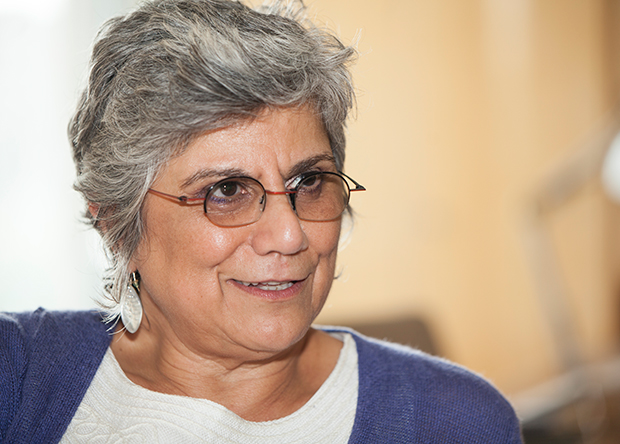 Ani Aprahamian
Ani AprahamianPhoto: Mediamax
My dream is to see the entire building renovated and brought to the standard of 21st century scientific institution. Then we can invite scientists with good ideas and desire to work, become the center of innovation and technology. We can create an environment where people understand each other well and cooperate in various scientific fields.
You mentioned that young specialists need to be given opportunities to grow. Armenia has multiple examples of elder scientists preferring to put themselves in the forefront. Will you promote young experts and be the senior colleague to support them?
I think there is more value in working with people who are better than you. Young people we teach should surpass us. They have great ideas and we need to promote them.
I know the Armenian system of elder experts instructing and managing young specialists. It is wrong. I appointed a young expert as deputy director for science and an academician said, “But they are too young!” (laughs – Mediamax).
We have formed a group of young specialists from different fields and I will work with them every week, discuss and develop ideas. I am going to help them apply for scholarships.
If my students succeed, I succeed with them. I feel prouder for it. I am working towards doubling the wages for scientists under 40 now. That will take a couple of months, because you cannot have reforms and success overnight.
You cooperate with the Foundation for Armenian Science and Technology (FAST). What is the role of private sector and similar foundations in advancement of our scientific sector?
It is great that Armenia has FAST and the foundation gives scholarships to students. But there was also Luys Foundation, which I think did not operate correctly. I consider it wrong to provide large sums to send students for studying abroad. They don’t return and the money could have been spent on huge reforms for local science.
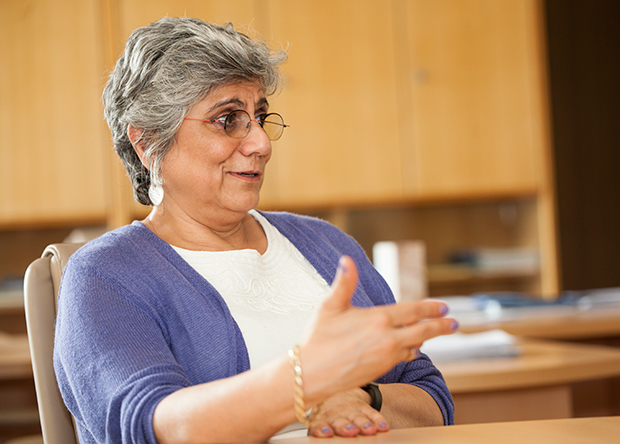 Ani Aprahamian
Ani AprahamianPhoto: Mediamax
It is important to keep the students in Armenia, create conditions for them in Armenia to work, think, and realize their ideas.
How do you imagine the future of science in Armenia, physics particularly?
It is important to determine what has to be done now. Shouldn’t we be able to compete at global level? If we manage that, we’ll find ourselves in an excellent position. We did so in the past. We have great resources now, so we should modernize, make our name and works known.
We must use all resources we have, the social networks and the media to create attractive representation of science and the works of our scientists.
Marie Taryan talked to Ani Aprahamian
Photos: Emin Aristakesyan









